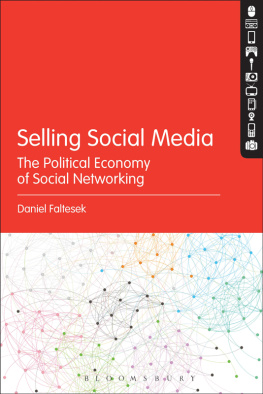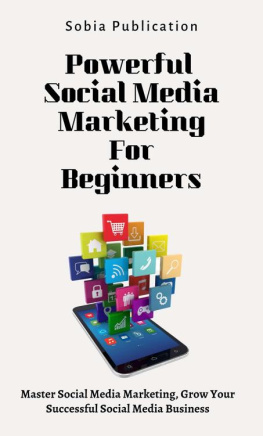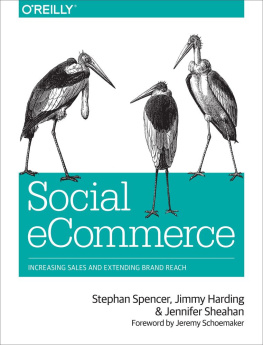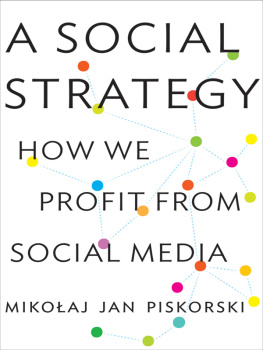Selling Social Media
Selling Social Media
The Political Economy
of Social Networking
Daniel Faltesek

For the users
All figures, apart from 4.2, are created by the author.
Books are hard to write; tracking their development over the years can be difficult. Over the years, David Depew, Gerald Voorhees, Joseph Bookman, Sofia Karatza, David Z. Morris, Hojin Song, Tim Havens, Paul E. Johnson, Rita Zajacz, Ron Seymour, Melissa Zimdars, Meryl Irwin, David Hingstman, G. Thomas Goodnight, anonymous reviewers, my parents, and many others have given feedback on ideas that appear in this book. Atilla Hallsby provided invaluable feedback throughout the writing process. My colleagues at Oregon State are the best: thank you.
It is entirely possible that you (the reader) engaged with some of these ideas on Facebook, Twitter, or some other social network. Those touch points are an important part of academic life in the early twenty-first century.
This book would not have been possible without the support of my partner Emily Kay Kirkeide Faltesek.
This is a book about the strategies that persuade users, investors, and governments to adopt a particular vision of the economy, technology, law, and communication enmeshed with social media. There are four key ideas that organize the sale of social media: monetization, securitization, disruption, and litigation. Before turning to explain the theoretical approach of this book, relationship to the existing literature, and chapter summaries, the stories of three different sales pitches for social networks can provide a starting point: the story of the Facebook IPO Roadshow, the launch of Twitter, and the failed launch of Google+.
Selling Facebook: The art of the S-1
In February 2012, Facebook filed form S-1, the document that declares a firms intention to sell capital stock to the public. At first glance this is unremarkable: the form summarizes revenues, opportunities, and risks. Tables, charts, and graphs communicate the distribution and proportion of various values over time. Generally accepted accounting practices and the threat of incarceration for fraud prompt those completing the form to be as accurate as possible. Documents (and further financial filings like from 10-K) are important resources for study. S-1 documents in non-media industries are typically drab. After a 1998 rule change by the Securities and Exchange Commission calling for documents to be presented in plain language, firms offering new shares to the public have increasingly plied their documents with pictures, letters, and other advertisements for the company presented as objective information.Zuckerbergs letter to potential investors from the S-1 is an exemplar of the genre, describing the ways that Facebook improves relationships, businesses, and even governments. Facebook could change democracy and the course of history.
According to Zuckerberg, By giving people the power to share, we are starting to see people make their voices heard on a different scale from what has historically been possible. These voices will increase in number and volume. They cannot be ignored. In this sense, Facebook is nothing less than a force that transforms the conditions of democratic life. It is not simply that the diverse voices of publics will be accessible, but that the affective position of governments will change. Once the intermediary moderation of the New York Times, CBS, and Fox are replaced by the intercession of Facebook, politicians will careor at least that is Zuckerbergs theory. Broader concerns with the structure of the public sphere and political accountability are less important in this model. Individuality is everything.
At the opening of the S-1 is an image with Facebooks characteristic logo and thumbs-up. A collage of users photos are superimposed with a claims hundreds of millions of photos uploaded per day, a network of one hundred billion friendships, nearly three billion likes and comments, in addition to approximately one billion monthly active users.
At the conclusion of a series of escalating metaphors, famously beginning with the claim that Facebook is a chair, the narrator compares the functions of Facebook to the totality of creation itself, The universe. It is vast and dark and makes us wonder if we are alone. So maybe the reason we make all these things is to remind ourselves that we are not. Existential hope sells. The corporate logo follows. Facebook is not a product or service, but the necessary counterpoint to anxiety in the human experience. The image of Facebook users lighting the darkness of a cold universe punctuates both their celebration of human communication and their appeal for a vast fortune.
Facebook brought swarms of lenses and star-power. The players ride in black Cadillac Escalade SUVs, keep their audiences waiting, and answer just a handful of questions. The audiences very financial lives hinge on the answers. Hollywood celebrities want for such importance. Even the stock market has need for the red carpet. The information exchanged is not about the fundamental business of the company, but about the dream of what the company might be. This process is not unique to the Facebook IPO. Selling a new security to the public is theater, and the roadshow is an integral part of the performance. Investors buy the dream, not the reality.
The roadshow is literally a show, often accompanied by paratextual supplements like videos. Selling a security is a transmedia event. Facebooks video was not structured in such a way as to describe the position of the company in terms of future business performance, but as the basic stuff of human communication. Visually, it featured fairly banal interviews with key people: David Ebersman, the Chief Financial Officer, Mark Zuckerberg, the Chief Executive Officer, and Sheryl Sandberg, the Chief Operating Officer, as well as a large number of users images. Faces of users were presented alongside the faces of the employees, with the narrative of the video beginning with the story of Facebook as a photo-sharing service. In this version of the history of Facebook, noticing the ways that people used their profile picture to build a narrative took the lead over other descriptions of the business. This is just one of many histories of Facebook that could be written, each of which would have their own commitments and entanglements. Instead of a history of technology, corporate strategy, or startup culture, Facebook told a story about users. Humanizing the story of Facebook happens both in the arguments made by the executives and also through the insistence on the images of users faces. Identification with the faces of users becomes the fulcrum for lifting the social network.
Faces of users exist in a more theoretical sense in the description of the most valuable advertising products for the network, at least at that time. In her description of sponsored stories, Sandberg makes it clear that inclusion in social context dramatically increases the value of advertising. The sponsored story product framed an advertisement as a recommendation from a friend. Nearly
For many popular press analysts, the initial instability of the stock was shocking, either because they had not read the S-1 that described in plain language some of the problems with company, including declining user growth, or because they were fully invested in the idea of the greatest IPO of all time.
The S-1 is a work of corporate art. The S-1 is functionally a formal document with blanks to fill and boxes to check. The aesthetic format of the document has an air of authority when speaking to affective and communicative questions. When properly completed an investor should be able to read the form and have learned the basic material needed to make an informed judgment about purchasing stock, the fundamentals. Filing an S-1 can be revealing, turning the opaque walls of the boardroom into glass. Privately held companies enjoy relative secrecy in operations compared with their publicly traded counterparts. Going public is not just a matter of revealing more information, but a declaration of maturity. As a right of passage, the S-1 marks that a firm is no longer a startup.
Next page










